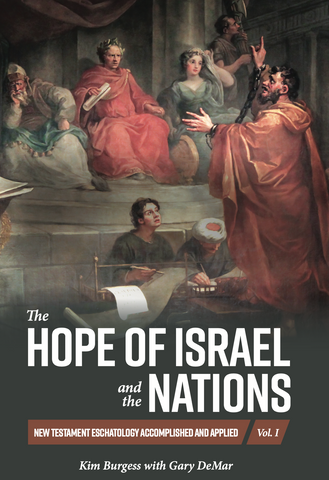The following is from Episode 16 of the second volume of The Hope of Israel and the Nations with Kim Burgess and me. Discussions regarding God’s law and its application in the here and now has a long history. Preterism did not stop the applicability of God’s Word in AD 70. It’s all about redemption accomplished and applied. Before preterism became a hot topic, biblical law was a subject of discussion with the publication of Rousas J. Rushdoony’s Institutes of Biblical Law in 1973 and Greg Bahnsen’s Theonomy in Christian Ethics in 1977. When Kim and I were at Reformed Theological Seminary in the mid-1970s, God’s law was a major point of contention. You can read about “What Really Happened at Reformed Theological Seminary”. Many books,[1] articles, and debates followed. What we’re seeing today is a revival of that debate among preterists.

The Hope of Israel and the Nations
The reader and student of the Bible must first understand the content of the New Testament writings in terms of how those in the first century would have understood it. The New Testament is written against the background of the Old Testament. The shadows of the Old were fulfilled in the reality of the New. All the rituals and ceremonies were fulfilled in Jesus. The same is true of the temple, land, blood sacrifices, the nature of redemption, the resurrection of the dead, the breaking down of the dividing wall dividing Jews and Gentiles, and so much more. The New Testament's emphasis is on the finished work of Jesus and its application, not only to that Apostolic generation but to the world today.
Buy NowGary: Like I said, Kim, when we were in seminary in the 1970s, Greg Bahnsen was teaching there, and we were reading works by R.J. Rushdoony and Gary North and other writers dealing with Christian worldview topics. I wrote about this in the first three chapters of *Theonomy: An Informed Response.*[2] If you were to ask the gainsayers—anytime the whole “Theonomy” and “Christian Reconstruction”[3] debates would come up—they would say, “Oh, you believe in salvation by law.” How often did we hear that? Our reply always was, “We don’t believe in salvation by law, and if you took the time to read anything we’ve written on the topic you would know what you claim is a lie!”[4] Are we saved by grace but exempt from following commandments like “do not to steal” or “do not murder”? Of course not. James stated that “faith without works” is a dead faith (2:14-26). (A tree is known by its fruit: Luke 6:43-45). Notice this from the Apostle Paul:
But we know that the Law is good, if one uses it lawfully, realizing the fact that law is not made for a righteous person, but for those who are lawless and rebellious, for the ungodly and sinners, for the unholy and profane, for those who kill their fathers or mothers, for murderers and immoral men and homosexuals and kidnappers and liars and perjurers, and whatever else is contrary to sound teaching, according to the glorious gospel of the blessed God, with which I have been entrusted (1 Tim. 1:8-11).
How could church discipline take place if there is no objective moral standard? Lawlessness is defined by the law and applies to everyone, Christians and non-Christians. The law is a tutor or guardian that leads us to Christ “so that we may be justified by faith” (Gal. 3:24). Being saved by grace does not give us the right to be lawless after justification. Once we are justified, the law ceases to be our guardian in leading us to Christ because we are now in a new position with God. We are justified in terms of Christ’s righteousness, not be keeping the law. Does this mean the commandments that showed us our sin, and the need for redemption, and led us to Christ are no longer in effect? Rushdoony offers a helpful correction to those who claim that since Jesus’ death, Christians are not obligated to follow even the Ten Commandments let alone other laws:
The purpose of grace is not to set aside the law but to fulfill the law and to enable man to keep the law. If the law was so serious in the sight of God that it would require the death of Jesus Christ, the only-begotten Son of God, to make atonement for man’s sin, it seems strange for God then to proceed to abandon the law! The goal of the law is not lawlessness, nor the purpose of grace a lawless contempt of the giver of the law.[5]
Paul did not abandon the law since he had this to say to the Corinthians:
It is actually reported that there is sexual immorality among you, and sexual immorality of such a kind as does not exist even among the Gentiles, namely, that someone has his father’s wife. You have become arrogant and have not mourned instead, so that the one who had done this deed would be removed from your midst (5:1-2).
How or by what standard did Paul use to call out this “sexual immorality”? He based it on three passages from the Mosaic legislation (Lev. 8:8; Deut. 22:30; 27:20). He makes a direct appeal to “Scripture” (what we call the Old Testament) in 1 Timothy 5:18 by quoting Deuteronomy 25:4 and referencing Leviticus 19:13: “You shall not oppress your neighbor, nor rob him.”
Kim: We do not believe that grace and law are pitted against each other.
Gary: Exactly. If you read anything that Rushdoony, North, and Bahnsen wrote in those days you will never find anything that intimated that keeping the law ever saved anyone. If you read the introduction to and then the whole of Rushdoony’s Institutes of Biblical Law, it was always presented in the context of being “new creatures in Christ.” There is the manifestation of this being “born again” and the “transformational” aspect of an individual applying the Word and law of God to every area of life. If one goes back to two of Rushdoony’s earliest books, Intellectual Schizophrenia (1961) and The Messianic Character of American Education (1963), the redemptive application is to the field of education. Gary North wrote an entire commentary series, some 35 volumes, on Biblical economics! The Greek word for “law” (nomos) is in the word “economics,” and the Bible has a lot to say about economics. You shall not steal is an economic law. So is having two different weights in a bag (Deut. 25:13) or cheating people by diluting wine and debasing money (Isa. 1:22).
Kim: Yes, indeed.
Gary: Of course, I also wrote my three volume God and Government series (now in a single volume), that shows how the new life in Christ applies to every area of life. The moral requirements of Biblical government apply to self-, family, church, and civil governments, always asking the question, by what biblical standard?
Kim: You are talking about the application of the Biblical moral law of God in society and culture today, but we both know that there are some forms of preterism (hyper-preterism) that create false dichotomies. They end up in rank antinomianism as if, “Oh, this means if Moses/the Old Covenant order is gone, then the whole of the OT law of God is gone too!” But the Scriptures, both Old and New Testaments, bend over backwards to refute this sort of antinomian nonsense. Paul even raised this issue directly in Romans 3:31: “Do we then nullify the Law through faith? May it never be! On the contrary, we establish the Law.” That is, because this New Covenant salvation in Christ by grace through faith alone, is the assertion then being made that the law of God doesn’t count; that the law of God is somehow being undermined? No, to the contrary, Paul declared the law of God was being established thereby! How so? Because the sanctifying purpose of this salvation by grace through faith in Christ and His Holy Spirit in the New Covenant Kingdom of God is precisely so that the requirement of the Law may and would be fulfilled in all those who “walk in and according to the Spirit” (Rom. 8:4).
But again, how so? Because the promise of the New Covenant per OT texts like Jeremiah 31:33 and Ezekiel 36:26-27 is that this same law of God, the divine moral order as reflected (summarized) in the Decalogue/Ten Commandments which are themselves as old as creation itself as Adam was created in the image of God “in knowledge and righteousness and holiness” and as later applied and illustrated in much greater detail in the civil or case laws of OT Israel, this same law was to be written by the Spirit on the hearts and minds of all the saints so that they, as redeemed people in Christ, will be willing and able to observe/keep them and thus fulfill what the law requires. This is what Paul was getting at in Romans 3:31 and 8:4, wholly contrary to any notion of antinomianism.
Gary: There are preterists who erroneously go down this antinomian path in the name of preterism and thereby give biblical preterism a bad name especially when they sound so much like dispensationalists.
Kim: Yes, of course.
Gary: For many dispensationalists and now some preterists, laws found the Old Testament are “Jewish law” and no longer applicable. In Dallas Theological Seminary’s scholarly journal, Bibliotheca Sacra, S. Lewis Johnson, a former professor at the seminary, argued that the Ten Commandments should not be a part of the Christian’s ethical life. He wrote the following:
Donald Grey Barnhouse, a giant of a man in free grace, wrote: “It was a tragic hour when the Reformation churches wrote the Ten Commandments into their creeds and catechisms and sought to bring Gentile believers into bondage to Jewish law, which was never intended either for the Gentile nations or for the church.” He was right, too.[6]
Barnhouse was the pastor of the Tenth Presbyterian Church in Philadelphia until his death in 1960. As a Presbyterian, he would have had to affirm the Westminster Confession of Faith and its catechisms. The Larger Catechism has a large section on the Ten Commandments. Before The Westminster Confession was formulated in the 17th century, Guido de Bres and the Reformed churches stated the following in the 1559 Belgic Confession, Article 25:
We believe that the ceremonies and symbols of the law ceased at the coming of Christ, and that all the shadows are accomplished; so that the use of them must be abolished among Christians; yet the truth and substance of them remain with us in Jesus Christ, in whom they have their completion. In the meantime we still use the testimonies taken out of the law and the prophets to confirm us in the doctrine of the gospel, and to regulate our life in all honorableness to the glory of God, according to His will.
As we can see, the Christian’s relation with the law in the NT has a long history.

Restoring the Foundation of Civilization
There are many Christians who will not participate in civilization-building efforts that include economics, journalism, politics, education, and science because they believe (or have been taught to believe) these areas of thought are outside the realm of what constitutes a Christian worldview. Nothing could be further from the truth.
Buy NowKim: In terms of the NT, we are under the Decalogue today (Matt. 28:20; John 14:15, 21; 15:10; 1 John 5:2-3; Rom. 13:8-10; 1 Cor. 7:19). And, no, it wasn’t a bad thing. What is Christian redemption all about in the first place if it is not about salvation from sin? And what is sin but “lawlessness” (1 John 3:4); the denial of, the transgression of the moral law of God? Yes, the law of God is the bottom line to all this redemption in Christ to restore us in the image of God in “knowledge, righteousness, and holiness” (Col. 3:10; Eph. 4:24). The work of law of God is written by grace on our hearts and in our minds so that we want and desire to keep the moral law. This is Psalm 119, over and over again. Through the life-long process of sanctification in Christ by the Holy Spirit—the “Spirit of holiness” (Rom. 1:4)—we come to hunger and thirst for what the law of God wants us to be and do.
Gary: What’s interesting about so much of what I’m hearing from some preterists about the Christian’s relationship to the law are some of the same arguments used by dispensationalists, the eschatological system many of today’s preterists abandoned!
Kim: Yes, there is so much confusion.
Gary: I don’t think it’s confusion. I really don’t. They are dishonest, because while they claim the moral law has been done away with, they still argue for some form of law. If a person is a “new creation in Christ,” he or she is obligated to apply some version of God’s Word to all areas of life. This means the areas of life where we live and work. Many of those who attack us on the topics of eschatology and law are dishonest. No preterist promotes lawlessness, and no critic of preterism is lawless. Everyone follows some moral standard. The question is, What’s its source?
[1] Greg L. Bahnsen, By This Standard: The Authority of God’s Law Today (1985) and No Other Standard: Theonomy and Its Critics (1991), and Greg Bahnsen and Kenneth Gentry, House Divided: The Break-Up of Dispensational Theology (1989).
[2] See the first three chapters in the 1991 book Theonomy: An Informed Response edited by Gary North. It is available in a reprint edition from American Vision.
[3] Gary DeMar, The Debate Over Christian Reconstruction (Atlanta, GA: American Vision, 1988), and Gary North and Gary DeMar, Christian Reconstruction: What It is, What It Isn’t (Tyler, TX: Institute for Christian Economics, 1991).
[4] From North and DeMar, Christian Reconstruction: “Regeneration—salvation by grace through faith—is man’s only hope in this age and in the age to come. Only new men who reflect the image of God in Christ can bring about any significant social change since social change follows personal change, and personal change can only come through regeneration. God’s sovereignty as it relates to personal salvation and limited institutional authority is foundational for the salvation of man and the abolition of tyranny” (81).
[5] The Institutes of Biblical Law (Nutley, NJ: The Craig Press, 1973), 4.
[6] S. Lewis Johnson, “The Paralysis of Legalism,” Bibliotheca Sacra, Vol. 120 (April/June 1963), 109.

